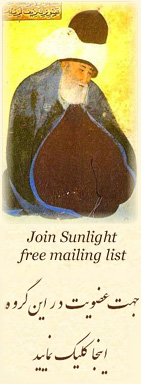The ritual prayer is five times daily,
but the guide for lovers is the verse,
they who are in prayer continually. *
The headache of intoxication in those heads
isn't relieved by five times, nor by five hundred thousand.
"Visit once a week" is not the ration for lovers;
the soul of sincere lovers has an intense craving to drink.
"Visit once a week" is not the ration for those fish,
since they feel no spiritual joy without the Sea.
~ ~ ~ ~ ~
Panj vaqt âmad namâz o rahnamun
`âsheqân-râ fî salâtin dâ'imûn*
Nah beh-panj ârâm girad ân khomâr
keh dar ân sar-hâst ni pânsad hazâr
Nist "zur ghibban" vazifeh-ye `âsheqân
sakht mostasqist jân-e sâdeqân
Nist "zur ghibban" vazifeh-ye mâhiyân
zânkeh bi Daryâ na-dârand ons-e jân
*al-Ma`ârij, 23
-- Mathnawi VI:2669-2670
Version by Camille and Kabir Helminski
"Rumi: Jewels of Remembrance"
Threshold Books, 1996
Persian transliteration courtesy of Yahyل Monastra
The media:
http://tinyurl.com/hd3h5








1 comment:
Sunlight post on Thursday Sept 28th contains four verses from the sixth book of Rumi's Mathnawi, which are some of most fervent and most attractive verses of Mathnawi for me. Rumi's high ingenuity and imagination in poetic comparing of Quranic verses with lovers' inner state has outbroken in these verses of Mathnawi. In these verses, he points to a Quran verse and gives a loveric interpretation of it.
In the Quran verse it's been said (about the Faithful) that they are in prayer continually. In Rumi's view, prayer is not merely the external state of it and as he has also described it in Fih-e-ma-Fih (a Rumi's prose book), all kinds of worship have both a body and a soul, a face and a meaning, an external aspect and an internal state. The body of prayer is the same words and acts while praying, and its soul is faith and connection to the Truth.
He says the ritual prayer doesn't suffice the lovers, but their criterion for prayer is the Quran verse (in prayer continually). So the lovers are continually in prayer. This means they are continually in the meaning of prayer, in the state of soul of prayer, and not (just) in its external shape. In this view, One can be praying while doing his/her regular life. Rumi knows the lovers as those who have Estesghaa (a disease in which the patient has a intense craving to drink water and he/she drinks water so much that it kills him/her). Rumi says the lovers are never fed up with visiting their Beloved, just like the patient(Mostasghi). This is also mentioned in Ghazal 1824.
Then Rumi refers to a word by Prophet Mohammad in which is said: "Meet your friends every other day (occasionally) so that your affection toward them increase." Rumi mentions that this rule is just for normal people. If normal people meet someone much, they get bored. While the lovers are never full of visiting their Beloved.
Then, in a parallel view, he symbolizes lovers as fish and the Beloved as the sea, and says: as the fish are enthusiasts of the sea and not only they don't get bored of the sea but also they feel no joy without it, and even they cannot live without the sea, the lovers are the same. Rumi has frequently used the fish symbol for lovers and seekers of truth (such as in book I of Mathnawi verse 17 and also in Ghazal no. 658 ).
While reading and enjoying the verses, I couldn't stop myself to share my view about them with my Rumi friends.
Regards,
Panevis.
Post a Comment